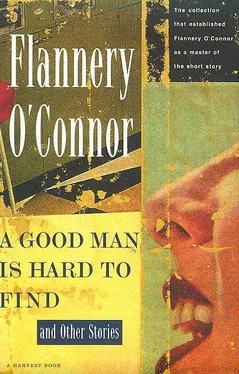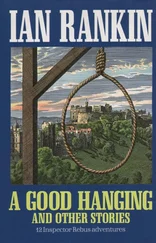The child retired to the upstairs window to get out of her way and looked down where her mother was walking off from the three boys who were squatting under the water tower, eating something out of a cracker box. She heard her come in the kitchen door and say, “They say they’ll go on the milk truck, and no wonder they aren’t hungry—they have that suitcase half full of food.”
“Likely stole every bit of it too,” Mrs. Pritchard said.
When the milk truck came, the three boys were nowhere in sight, but as soon as it left without them their three faces appeared, looking out of the opening in the top of the calf barn. “Can you beat this?” Mrs. Cope said, standing at one of the upstairs windows with her hands at her hips. “It’s not that I wouldn’t be glad to have them—it’s their attitude.”
“You never like nobody’s attitude,” the child said. “I’ll go tell them they got five minutes to leave here in.”
“You are not to go anywhere near those boys, do you hear me?” Mrs. Cope said.
“Why?” the child asked.
“I’m going out there and give them a piece of my mind,” Mrs. Cope said.
The child took over the position in the window and in a few minutes she saw the stiff green hat catching the glint of the sun as her mother crossed the road toward the calf barn. The three faces immediately disappeared from the opening, and in a second the large boy dashed across the lot, followed an instant later by the other two. Mrs. Pritchard came out and the two women started for the grove of trees the boys had vanished into. Presently the two sunhats disappeared in the woods and the three boys came out at the left side of it and ambled across the field and into another patch of woods. By the time Mrs. Cope and Mrs. Pritchard reached the field, it was empty and there was nothing for them to do but come home again.
Mrs. Cope had not been inside long before Mrs. Pritchard came running toward the house, shouting something. “They’ve let out the bull!” she hollered. “Let out the bull!” And in a second she was followed by the bull himself, ambling, black and leisurely, with four geese hissing at his heels. He was not mean until hurried and it took Mr. Pritchard and the two Negroes a half-hour to ease him back to his pen. While the men were engaged in this, the boys let the oil out of the three tractors and then disappeared again into the woods.
Two blue veins had come out on either side of Mrs. Cope’s forehead and Mrs. Pritchard observed them with satisfaction. “Like I toljer,” she said, “there ain’t a thing you can do about it.”
Mrs. Cope ate her dinner hastily, not conscious that she had her sunhat on. Every time she heard a noise, she jumped up. Mrs. Pritchard came over immediately after dinner and said, “Well, you want to know where they are now?” and smiled in an omniscient rewarded way.
“I want to know at once,” Mrs. Cope said, coming to an almost military attention.
“Down to the road, throwing rocks at your mailbox,” Mrs. Pritchard said, leaning comfortably in the door “Done already about knocked it off its stand.”
“Get in the car,” Mrs. Cope said.
The child got in too and the three of them drove down the road to the gate. The boys were sitting on the embankment on the other side of the highway, aiming rocks across the road at the mailbox. Mrs. Cope stopped the car almost directly beneath them and looked up out of her window. The three of them stared at her as if they had never seen her before, the large boy with a sullen glare, the small one glint-eyed and unsmiling, and Powell with his two sided glassed gaze hanging vacantly over the crippled destroyer on his shirt.
“Powell,” she said, “I’m sure your mother would be ashamed of you,” and she stopped and waited for this to make its effect. His face seemed to twist slightly but he continued to look through her at nothing in particular.
“Now I’ve put up with this as long as I can,” she said. “I’ve tried to be nice to you boys. Haven’t I been nice to you boys?”
They might have been three statues except that the big one, barely opening his mouth, said, “We’re not even on your side the road, lady.”
“There ain’t a thing you can do about it,” Mrs. Pritchard hissed loudly. The child was sitting on the back seat close to the side. She had a furious outraged look on her face but she kept her head drawn back from the window so that they couldn’t see her.
Mrs. Cope spoke slowly, emphasizing every word. “I think I have been very nice to you boys. I’ve fed you twice. Now I’m going into town and if you’re still here when I come back, I’ll call the sheriff,” and with this, she drove off. The child, turning quickly so that she could see out the back window, observed that they had not moved; they had not even turned their heads.
“You done angered them now,” Mrs. Pritchard said, “and it ain’t any telling what they’ll do.”
“They’ll be gone when we get back,” Mrs. Cope said.
Mrs. Pritchard could not stand an anticlimax. She required the taste of blood from time to time to keep her equilibrium. “I known a man oncet that his wife was poisoned by a child she had adopted out of pure kindness,” she said. When they returned from town, the boys were not on the embankment and she said, “I would rather to see them than not to see them. When you see them you know what they’re doing.”
“Ridiculous,” Mrs. Cope muttered. “I’ve scared them and they’ve gone and now we can forget them.”
“I ain’t forgetting them,” Mrs. Pritchard said. “I wouldn’t be none surprised if they didn’t have a gun in that there suitcase.”
Mrs. Cope prided herself on the way she handled the type of mind that Mrs. Pritchard had. When Mrs. Pritchard saw signs and omens, she exposed them calmly for the figments of imagination that they were, but this afternoon her nerves were taut and she said, “Now I’ve had about enough of this. Those boys are gone and that’s that.”
“Well, we’ll wait and see,” Mrs. Pritchard said.
Everything was quiet for the rest of the afternoon but at supper time, Mrs. Pritchard came over to say that she had heard a high vicious laugh pierce out of the bushes near the hog pen. It was an evil laugh, full of calculated meanness, and she had heard it come three times, herself, distinctly.
“I haven’t heard a thing,” Mrs. Cope said.
“I look for them to strike just after dark,” Mrs. Pritchard said.
That night Mrs. Cope and the child sat on the porch until nearly ten o’clock and nothing happened. The only sounds came from tree frogs and from one whippoorwill who called faster and faster from the same spot of darkness. “They’ve gone,” Mrs. Cope said, “poor things,” and she began to tell the child how much they had to be thankful for, for she said they might have had to live in a development themselves or they might have been Negroes or they might have been in iron lungs or they might have been Europeans ridden in boxcars like cattle, and she began a litany of her blessings, in a stricken voice, that the child, straining her attention for a sudden shriek in the dark, didn’t listen to.
There was no sign of them the next morning either. The fortress line of trees was a hard granite blue, the wind had risen overnight and the sun had come up a pale gold. The season was changing. Even a small change in the weather made Mrs. Cope thankful, but when the seasons changed she seemed almost frightened at her good fortune in escaping whatever it was that pursued her. As she sometimes did when one thing was finished and another about to begin, she turned her attention to the child who had put on a pair of overalls over her dress and had pulled a man’s old felt hat down as far as it would go on her head and was arming herself with two pistols in a decorated holster that she had fastened around her waist. The hat was very tight and seemed to be squeezing the redness into her face. It came down almost to the tops of her glasses. Mrs. Cope watched her with a tragic look. “Why do you have to look like an idiot?” she asked. “Suppose company were to come? When are you going to grow up? What’s going to become of you? I look at you and I want to cry! Sometimes you look like you might belong to Mrs. Pritchard!”
Читать дальше









